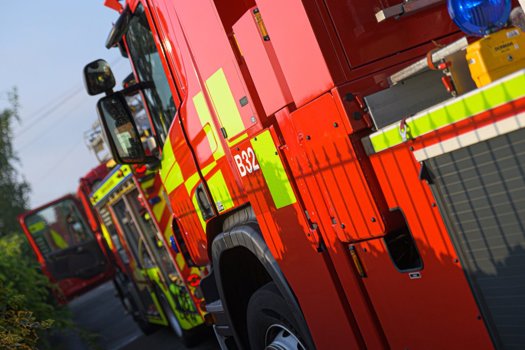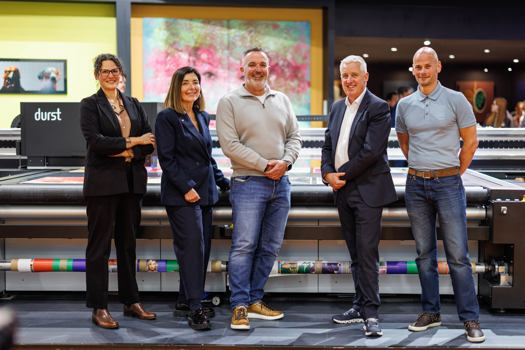For almost six decades he has run the family letterpress, come stationery, come toyshop business WF Arber & Co in east London, and if he had his way, he would probably run it for a few decades more. But parking restrictions and rising business rates have forced him to close for good, so we took the opportunity to ask him about his career, bureaucratic strife, losing the battle but ultimately winning the war, and the trifling matters of being a core part of the strategy to wipe out tuberculosis (TB) in the UK and helping women get the vote.
Darryl Danielli The business was started in 1897 by your grandfather. Was he a printer before that?
Gary Arber I don’t know to be honest. He was young so he must have learned his trade. I know that he started off as a box maker here. Then to print the boxes, he started buying type and machines and it all started from there. Then the printing part of the business overtook the box making. Funnily enough, back then tea used to come loose in half-pound packets. Well, that paper packet was designed by my grandfather. There used to be an engineering firm nearby on Medway Road called Fricker and they designed and built the machine.
So did your dad take over from your grandfather then?
Well no. My father died quite young. I was a career airman; I had no intention of being a printer, although I did learn the trade at the London School of Printing before I started my National Service. I always wanted to be a pilot, but you couldn’t fly on National Service so I had to sign on with the RAF. I was actually flying Avro Lincoln heavy bombers out of RAF Scampton [where the Dambusters were based] when my father died. My grandparents were still alive and they depended on the income and the place was busy, so I had to buy myself out of the RAF in 1954 and come here to run the business. We were just about to retrain on the Vulcan bombers too, so I never flew a jet.
And I guess now it’s another end of an era?
Well, yeah, it is I suppose. The business has survived two wars. My grandfather talked about how he used to stand in the doorway and watch the Zeppelins go past, and we had a near miss in the Second World War too. There used to be a huge furniture factory behind the garden and my grandparents, who lived above the business, were in the bomb shelter in the garden when it was hit. The fireman got them out just before the factory wall flattened the garden, the business survived though.
And now the presses will survive too. It must be good to know that they’re going to a good home?
It really is. A lot of people were trying to take them, but all those efforts came to nothing, and in the end I would have had to cut them up with a torch because it would have cost a fortune to remove them properly. Even a scrap merchant would probably have wanted paying to take them away because the cost of the gas would have been more than the value of the scrap iron.
Really?
Yeah, there’s no value in iron.
Looking around, I’m guessing you haven’t been using many of the presses of late though?
That’s right, I’ve only been using the ’berg [Heidelberg auto-platen]. And that one’s got a story to it because we’ve got no idea who got the money for it. It was delivered in the summer of 1939 direct from Heidelberg and the war started before we had a chance to pay for it, so we had to give the money to the British government – and I’m not convinced that they gave the money to Heidelberg six years later.
Is that the newest press here then?
Well no, the Lagonda came in in 1947 and the Supermatic and [Glockner] Mercedes cylinders were installed in the early 1950s. But the Golding [Jobber] and Wharfedale go right back to the early days, we used to have another big platen called a Bremner, but we got shot of that when we bought the Heidelberg. It was a busy place.
Which was your favourite machine?
The Heidelberg. Well, except when it came to the big stuff, then it would have been the crown Mercedes because that had a deep pile feed.
All of those machines must have made some serious noise when they were all running?
Oh, they did. In fact, the building used to shake in its heyday.
You never moved into litho though, how come?
To print litho you had to buy a litho machine, and where was I going to put it? I’ve had a good living out of letterpress though, but I only did the rough stuff in the end, never cards or letterheads, there was no money in them. I just liked doing the stuff that made the money.
How many people used to work here at its peak?
It started off with just the family, but in its heyday there were six minders in the basement, three comps upstairs, and then cutters and packers too. There must have been about a dozen staff at one point.
What sort of work were you doing?
Government jobs mainly, through The Stationery Office (TSO). Forms for the government, Inland Revenue, Customs and Excise, probably every government department at one time or another. It was boring really. We printed for some really tiny departments, too, for example one was called the Commonwealth Bureau of Agricultural Parasitology.
What’s that then?
Haven’t a clue – we just printed for them. I never read anything. It all just came from TSO.
Nowadays you probably would have had to fill in more pages of pre-qualifying questionnaires than there were pages in those jobs.
You’re probably right, but back then we just had a contract. One time when meat rationing was coming to an end, we had the contract to print all the notifications. It was super-secret though. We had a TSO bloke here making sure that all the spoils went into his sack, so that nothing leaked out about meat coming off ration. We all had to swear not to tell anyone.
Was it just government work that you used to produce then?
Oh no, we did lots of private jobs – anything really, even menswear catalogues. This used to be a thriving area [Roman Road]. There were lots of factories here. It used to be a satellite town that people commuted to; all of the roads around here were full of factories. They’ve all gone. It’s just flats, and soon there’ll be a few more.
Is that what’s going to happen to the building?
The sale is going through now. It will be flats and a shop, and perhaps a town house out the back.
You used to print catalogues though?
Oh yes, anything at all really as long as it was black. I couldn’t print in colour; I never liked it.
I read on the Spitalfields Life blog that the flyers handed out by the Suffragettes, and their posters, were printed here.
That’s right. We did the leaflets on the old shaft-driven Golding. My grandmother was an active Suffragette and a friend of Mrs Pankhurst. She was a frightening women and you couldn’t argue with her. She made my grandfather do all their printing for nothing. But he didn’t like it because he was a local Tory activist and completely opposed to the women’s movement.
I’m guessing there were a few fireworks then?
Well, I wasn’t around then, but I think she would have won the arguments. She never spoke about the Suffragettes to me, except once: I was talking to her about the Krays throwing someone into the canal and she told me that once when she was in the Suffragettes they had thrown someone in the canal and pushed him down with a pole. That was my grandmother.
It sounds like she definitely won that argument then. Any other famous jobs?
We did a lot for CND. We got in with them because Father Gresham Kirkby [the vicar of the nearby St Paul’s, Bow Common] was one of the founders of CND.
So you’ve been involved with many of the big social change movements in 20th century?
The strangest thing really is that I’m very left wing, but once when I went on my annual fortnight’s holiday, my aunt looked after the shop and took a job for something called the Union Movement. She knew I liked to support the unions, so they printed the job. When I came back and went through the files to see what they had been up to, I realised that they had printed this job for Mosley’s fascists, which he called Union Movement. I said to my aunt: ‘What are you doing with this? It’s supporting racism and all that.’ And she just said: ‘It’s a union isn’t it? And you’re all labour.’
Not the business’s finest hour then?
Not exactly. Funnily enough I ‘lost’ the file copies of that job shortly afterwards and made it known that we wouldn’t be printing anything else for them.
When was the firm’s heyday?
It all died in the 1960s really. Before that the area was booming. You could hear all the factory hooters blowing at 8am for miles around. Apart from the old Waterlow printworks by the canal, which used to print railway tickets for companies all over the world, they had a dirty great bell.
If the business was starting to suffer in the 60s, with all the factories moving away, is that when you lost all the staff and started running it on your own?
Well, technically, it all ended with a war.
A war?
There was this irritating woman; a factory inspector. She inspected the business and told me that the comp room, which was my grandparents’ old front parlour and had wallpapered walls, had to be painted white because it was an industrial workplace. But the comps liked the wallpaper. She also condemned the wear on the staircases too. And then she said all the machines had to have guards. I said it wasn’t practical, but she went on and on. So in the end I gave her a little advice and suggested she go up to the traffic lights, then up to the right, then she would come to a little roundabout, if she turned left there she would come up to a little park with a big pond in it and then she could go and bloody jump in it. So after that they crossed me off the factory list and I had to sack everybody in the late 60s.
So it was just you from then?
Yes, but I was making more money on my own than I was with all the staff. Before that I was unionised, so it was one press, one man. But I could run four presses on my own, I had to do a fair bit of running around though.
And you’ve still got all your fingers?
More or less, although one of them is a bit bashed.
What sort of work are you doing now?
Now? Nothing. Well, I did some mini-cab booking forms at the start of the year, but that was probably one of the last jobs. I printed some cards for the Edinburgh Festival last year. Oh, I also did some petty cash vouchers at the start of this year, but thinking about it that was the last job. All the type’s being chucked into sacks for scrap – a lot of it’s pied. I must have a couple of tonnes of the stuff upstairs. I’ve got until the end of May to get rid of it.
But that’s worth money isn’t it?
The only thing that’s really worth anything are the old type cases. I’ve got more than 200 of them. I’m not going to let them all go at once though; I don’t want to flood the market. Same as the woodblocks, I’ve got some beautiful blocks – but all the good stuff I’ll sell when I’m retired.
You’re 82 now. Isn’t it a bit late to retire? Aren’t you going to miss the printing?
I’ll adapt. I’ve got plenty to keep me occupied; I’m a keen wildlife photographer and also have a half-acre garden to keep me busy.
I’m guessing you’re busy right now clearing everything out ready to leave in May?
Just a bit. Other than the ’berg, I haven’t seen the other presses for years, they were all covered in junk, so it’s good to see them again. The only one that wasn’t hidden was the Heidelberg because that was the one I was using. In fact the Lagonda was my safe, it was covered in rubbish but I used to put the petty cash in the back of the machine.
Surely you’re too famous to keep cash on the premises? You’re a local celebrity now; how does that feel?
I’m not sure about being a celebrity. I think I’m more what they call an anachronism.
That seems a bit harsh, but I’m guessing you enjoyed that though. What have been your highlights in your 60 years running the business?
I suppose the fact that we were part of the battle to eradicate TB believe it or not, when we printed for the government. Back in the 1950s, TSO bought all of the yellow card available in the country. There was a lorry parked out front in the road that was used as a sort of warehouse. We had to print these medical cards that had loads of tick boxes on them and at the top it said bacillus Calmette–Guérin, the vaccine that beat TB. So we had to print one for everyone that was going to have the vaccine – the Supermatic and Mercedes were going flat out with them.
What have been the toughest times for the business though?
Well, this used to be very successful toyshop up until 1970s as well as a printers. The old boy nearly went broke in the 1930s at the height of the great depression. It was coming up to Christmas – I think 1929 or maybe 1930 – and my aunt went out and bought a load of 18-inch undressed dolls and some muslin and tinsel and she worked night and day to make them into fairy dolls. She filled the front window with them and they were so successful it saved the old man from going bust; she did them for quite a few years in the end. But without the dolls back then, the print business probably wouldn’t have survived.
So I guess that even though that was before your time, perhaps there’s a lesson there about the power of diversifying the business. What else have you learned in your 60 years with the business?
The most important thing was to be polite to customers and do what they want... within reason. I’ve always got time to chat; talking to customers is important. There have been some characters over the years, though. The funniest was a chap called Fiddler Cooper, he was so crooked he looked crooked. He came in once and asked me to sign a folded sheet of paper, I asked him what it was and he told me not to worry about it. I grabbed it and had a look at it and it was a hire-purchase agreement to buy a greenhouse, and I would have been signing to guarantee the debt.
Sounds like a describing him as a character was very polite. But I guess now that letterpress is back in fashion you’ve probably had a few more Hoxton trendies, rather than traditional East End characters, showing an interest nowadays?
Oh yes, it’s definitely coming back into fashion. It’s not the same though; the things that people want nowadays would have had you shot in my day. Funnily enough, I had an enthusiast down here the other week and he was talking about how people think letterpress prints should be pushed out at the back, or debossed like Braille. I remembered how at the London School of Printing I was taught by RG Radford that the back of the sheet should be smooth like a baby’s bum. He was a short, fiery little bloke, Radford.
Sounds terrifying.
There was this one time when he nearly exploded. Boys were sent to the school from the printing firms and this particular one was talking about spaces rising on the cylinders. The boy chipped in that what he did up at his place was use a bodkin and just give the cylinder a whack. Old Radford nearly blew up. That’s where the term bodger came from though.
As you are 82, do you think you would have decided to close the business even if the council hadn’t changed the parking arrangements and if the business rates hadn’t gone up to the point when you had to subsidise the business?
No, I would have kept going. It was the traffic cameras that did for me really.
You still enjoy it then?
Well, that might be a bit strong, but it was something to do. I was only here Monday to Friday, never Saturdays.
Do you think if you had your time again you would be a printer though?
No chance. I would have been flying jet bombers. But I suppose print actually saved my life.
How do you mean?
Well all my Air Force friends retired from the RAF in their 50s and they all got fat and died. I’m 82 and still fit. I’ve outlived them all because of this place.










